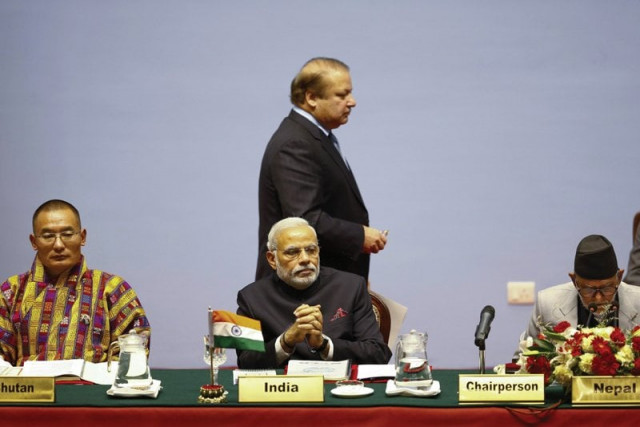Challenges ahead: The ups and downs of Pakistan’s foreign policy
After a brief period of bonhomie created by PM Nawaz’s visit to Delhi, ties with India have nosedived.

Prime Minister Nawaz Sharif with his Indian counterpart Narendra Modi at the Saarc summit. PHOTO: FILE
Prime Minister Nawaz Sharif’s visit to New Delhi in May 2014 for the swearing-in ceremony of India’s new Prime Minister Narendra Modi, was celebrated as a major foreign policy initiative despite the hardline stance adopted by the Bharatiya Janata Party (BJP) during electioneering.
Despite the optimism generated by Nawaz’s visit, the bonhomie lasted only a few months as New Delhi cancelled the scheduled foreign secretary-level talks with Islamabad quoting objections to meetings between Pakistan’s high commissioner in Delhi and leaders from disputed Kashmir.

Since then, tensions between the two nuclear armed neighbours have continued to rise with a string of ceasefire violations along the Line of Control (LoC) and working boundary.
Despite a warm handshake between Nawaz and Modi during the Saarc summit in Nepal in November and occasional tweets by the Indian prime minister wishing his Pakistani counterpart on his birthday, there is no indication the two countries are anywhere near to resuming their stalled peace process.
The uncertainty surrounding Pakistan’s relations with its key neighbour—India—sums up the daunting challenge faced by the Nawaz’s government on the foreign policy front during 2014. The PML-N, which was voted to power in June 2013, had pledged to revisit Pakistan’s foreign policy. One of the key facets of the current government’s policy was to reach out to its immediate neighbours.
Afghanistan
While the approach of the Nawaz’s government has backfired with India, it has gained partial success when it comes to ties with neighbouring Afghanistan and Iran. The change of administration as a result of formation of a unity government in Afghanistan has helped Islamabad to take a new start with Kabul.
The visit of Afghan President Ashraf Ghani to Islamabad in November, where the two countries pledged to move away from the relationship of mistrust to one built on mutual cooperation, was seen as a watershed moment for regional stability.
Relations between Islamabad and Kabul remained tense during the fag end of Karzai’s extended term in office, who often accused Pakistan’s security establishment of supporting the Afghan Taliban. But the unprecedented visit of Ghani to the GHQ in Rawalpindi was a strong message that both he and his administration were willing to work with Pakistan’s security establishment.
The start of a military offensive by Afghan security forces against sanctuaries of the Tehreek-e-Taliban Pakistan (TTP) in Kunar province following the December 16 Peshawar school massacre is also seen as a new beginning in bilateral relations of the two countries which were often marred by mistrust and suspicion.
It is believed that Pakistan’s diplomatic outreach with the new Afghan leadership has convinced both Kabul and Washington that the military offensive in North Waziristan, considered to be the hotbed of local and foreign militants, has significantly depleted the operational capacity of the Haqqani Network - the deadliest of all Afghan insurgent groups.
With US-led forces out of the war-torn country, relations between Pakistan and Afghanistan would become even more important in the coming year and are likely to shape future regional security.
United States
Islamabad’s relationship with Washington has remained central to Pakistan’s foreign policy over the past few years, particularly after the 9/11 attacks. Despite being allies in the fight against terrorism, relations between the two have been marred by a series of ups and downs.
But, 2014 was different as the outgoing year went without any major controversy between the two countries. The only irritant that remained between the two countries was the continuation of the US drone campaign. However, increasingly Pakistan’s public condemnation of drone strikes in the tribal areas is seen more as a ritual rather than real opposition. Years of mistrust due to the US secret raid in Abbottabad in 2011 to kill al Qaeda chief Osama bin Laden and other incidents considerably reduced in 2014.
Unlike previous years, there has been public acknowledgement by Washington of Islamabad’s push against militants. However, the real test of this relationship is yet to come as US completes its mission in Afghanistan.
China
The only country with which Pakistan has predicable relationship is China. 2014 also saw an upward trend in cooperation, although the first visit by a Chinese president in years had to be cancelled due to political unrest in the country. Pakistan considers China central to its foreign policy because of close proximity and convergence of interest in this part of the region.
Iran
Relations with Iran have never been easy considering the pressure Pakistan has to deal with from its Arab allies as well as the US. Although, Prime Minister Nawaz is considered close to Saudi Arabia, his visit to Tehran in 2014 was a clear message that Pakistan cannot ignore Iran.
Russia
It has been many years now since Pakistan and Russia have been trying to open a new chapter in their otherwise checkered relationship. Both former cold-war rivals were trying to bury the past and the rare visit of Russian defence minister suggested that realignment is taking place in this part of the world necessitated by the regional changes.
RETROSPECTIVE




Published in The Express Tribune, January 1st, 2014.



















COMMENTS
Comments are moderated and generally will be posted if they are on-topic and not abusive.
For more information, please see our Comments FAQ